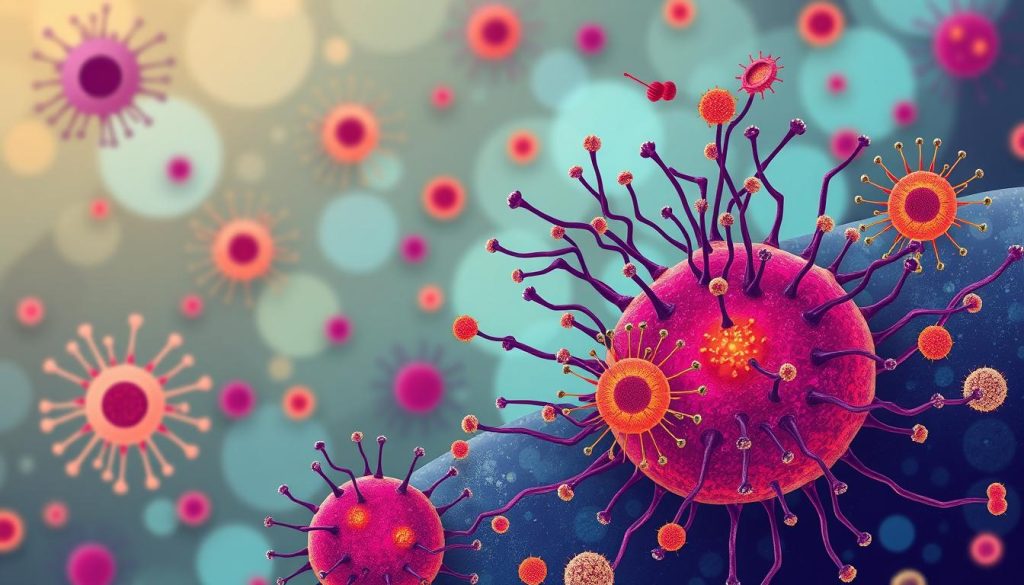CAR T cell therapy is a new way to fight cancer. It uses the body’s immune system to attack cancer cells. But, it can cause hair loss as a side effect. Many people lose their hair while getting this treatment. It’s a big worry for those going through it. But, knowing why it happens and when it might stop can help.
We’ll look at how CAR T cell therapy leads to hair loss. We’ll talk about the different types, how long it lasts, and ways to cope. We’ll also share stories from patients and the value of talking to your doctor about hair loss.
Our goal is to help patients and their families understand this side effect. We want to support them as they face the ups and downs of this treatment.
What is CAR T Cell Therapy?
CAR T cell therapy is a new way to treat some blood cancers. It uses a patient’s own immune system to fight cancer. This is a big step in personalized medicine.
Understanding the Basics of CAR T Cell Treatment
This therapy starts by taking a patient’s T cells, a kind of white blood cell. Then, these cells are changed in a lab. They get special receptors that help them find and kill cancer cells.
After being changed, the T cells are grown in the lab. They are then given back to the patient. These cells then go after and destroy cancer cells, giving a strong fight against cancer.
How CAR T Cell Therapy Differs from Traditional Cancer Treatments
CAR T cell therapy is different from old treatments like chemotherapy and radiation. Old treatments can harm healthy cells too. But CAR T cell therapy is more precise, targeting only cancer cells.
“CAR T cell therapy is like giving patients a living drug. We’re taking immune cells out of their bodies, engineering them to recognize and attack cancer cells, and giving them back to the patient.”
| Feature | Traditional Cancer Therapy | CAR T Cell Therapy |
|---|---|---|
| Approach | Broad-spectrum, affects both cancerous and healthy cells | Targeted, specific to cancer cells |
| Immunotherapy | Not typically immune-based | Uses the patient’s own immune system |
| Personalization | One-size-fits-all | Made for each patient’s immune cells |
By using a patient’s immune system, CAR T cell therapy is a new hope against blood cancers. As research grows, this personalized medicine could change how we treat cancer.
The Link Between CAR T Cell Therapy and Hair Loss
CAR T cell therapy is a new hope for some cancers. But, it can cause hair loss. It’s important for patients and their families to understand this link.
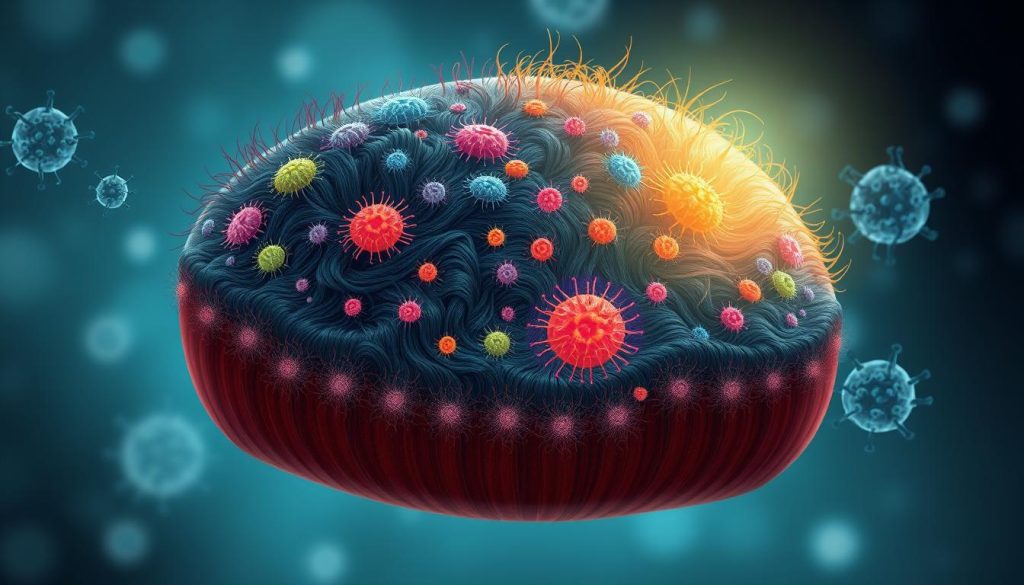
Why Hair Loss Occurs During CAR T Cell Treatment
Hair loss happens because of the chemotherapy before CAR T cell treatment. This chemotherapy, with cyclophosphamide and fludarabine, clears out old immune cells. It makes room for the new CAR T cells to fight cancer.
The chemotherapy also affects hair follicles. This can lead to thinning or even complete hair loss, known as alopecia. It usually starts a few weeks into the treatment.
Prevalence of Hair Loss in CAR T Cell Therapy Patients
Many patients lose their hair during CAR T cell therapy. Here’s what studies say:
- About 60-70% of patients experience hair loss.
- 30-40% of patients lose all their hair (alopecia totalis).
- 20-30% of patients have partial hair loss (alopecia areata).
Even though these numbers seem high, hair loss is usually temporary. Hair starts growing back a few months after treatment. Scientists are working hard to reduce hair loss and help hair grow back in CAR T cell therapy patients.
Types of Hair Loss Associated with CAR T Cell Therapy
Patients getting CAR T cell therapy might see different hair loss types. Alopecia areata and telogen effluvium are the most common. Knowing about these can help patients deal with treatment side effects.
Alopecia Areata and CAR T Cell Treatment
Alopecia areata is an autoimmune condition that can start with CAR T cell therapy. It shows up as round, smooth patches of hair loss on the scalp or body. The exact reason is unclear, but it’s thought the immune system attacks hair follicles, causing patchy loss.
For alopecia areata in CAR T cell therapy patients, treatments include:
- Topical corticosteroids
- Intralesional corticosteroid injections
- Immunotherapy drugs, such as Janus kinase (JAK) inhibitors
Telogen Effluvium and Its Relation to CAR T Cell Therapy
Telogen effluvium is a temporary hair loss. It happens when many hair follicles enter the resting phase too soon. It’s often caused by stress, which is common during cancer treatment like CAR T cell therapy.
People with telogen effluvium see hair thinning or shedding all over. It starts a few months after the stressful event or treatment. This is because the affected follicles shed their hairs at the same time.
“I started noticing more hair on my pillow and in the shower drain about three months after my CAR T cell therapy. It was a bit alarming at first, but my doctor assured me that telogen effluvium is a common side effect and that my hair would likely grow back once my body recovers from the stress of treatment.” – Sarah, CAR T cell therapy survivor
| Hair Loss Type | Characteristics | Causes in CAR T Cell Therapy |
|---|---|---|
| Alopecia Areata | Patchy, sudden hair loss | Altered immune response |
| Telogen Effluvium | Diffuse hair thinning or shedding | Physical or emotional stress |
Severity and Duration of Hair Loss During CAR T Cell Treatment
Hair loss is a common side effect of CAR T cell therapy. The severity and how long it lasts can differ for each person. Most people will see some hair loss, from mild thinning to complete baldness. The hair loss timeline usually starts a few weeks after treatment begins and can get worse over time.
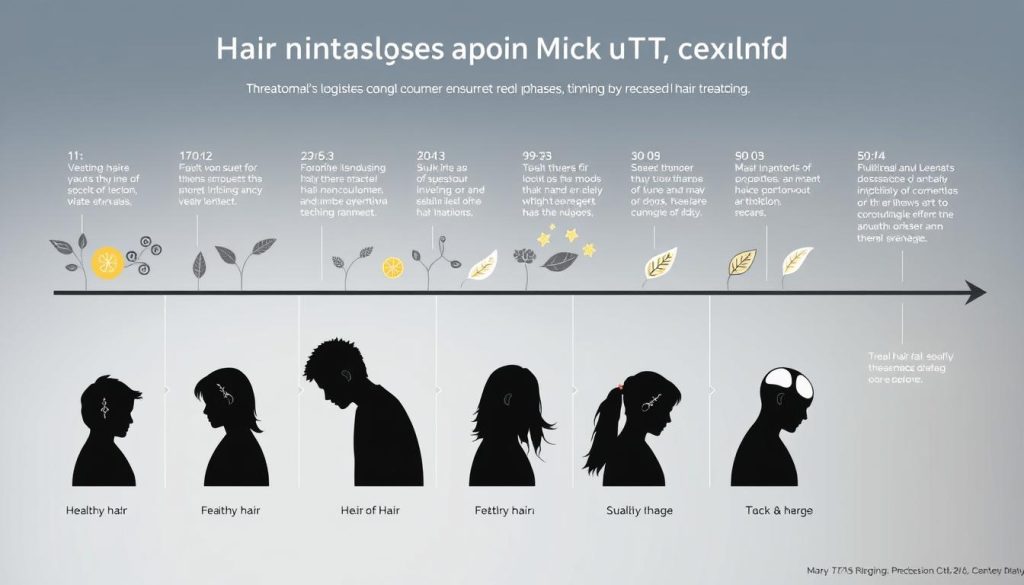
Things like the CAR T cell therapy type, the patient’s health, and personal traits can affect how much hair is lost. Some might lose hair quickly and a lot, while others might see it thin out more slowly. Below is a general guide on what to expect with hair loss during CAR T cell treatment:
| Treatment Stage | Expected Hair Loss |
|---|---|
| Pre-treatment | None |
| 2-3 weeks post-infusion | Mild thinning |
| 1-2 months post-infusion | Moderate to severe thinning |
| 3-6 months post-infusion | Peak hair loss (possible complete baldness) |
“I started noticing hair coming out in clumps about a month after my CAR T cell infusion. It was emotionally challenging, but I knew it was a temporary side effect of the treatment that was saving my life.”
Even though hair loss during CAR T cell therapy can be tough, it’s usually not permanent. Most people see their hair grow back a few months after treatment ends. The exact time can vary. Talking openly with your healthcare team about your hair loss worries can help you deal with this treatment side effect better.
Managing Hair Loss During CAR T Cell Therapy
Dealing with hair loss during CAR T cell therapy can be tough. But, there are ways to handle it. Hair loss management may not stop hair thinning, but it can help you feel in control. It also boosts your confidence during treatment.
Coping Strategies for Patients Experiencing Hair Loss
Here are some ways to cope with hair loss during CAR T cell therapy:
- Joining support groups to connect with others who understand the challenges of hair loss during cancer treatment
- Engaging in stress-reducing activities like meditation, yoga, or gentle exercise
- Focusing on self-care and pampering, such as scalp massages or skincare routines
- Embracing positivity and celebrating treatment milestones, regardless of hair loss
Cosmetic Options for Disguising Hair Loss
There are cosmetic solutions to hide hair loss during CAR T cell therapy:
| Cosmetic Option | Description | Benefits |
|---|---|---|
| Wigs | Realistic hairpieces available in various styles and colors | Provides a natural appearance and allows for style versatility |
| Scarves and Turbans | Fashionable head coverings in diverse fabrics and patterns | Offers comfort, breathability, and a stylish way to conceal hair loss |
| Hats and Caps | Protective head coverings suitable for various occasions | Provides sun protection, warmth, and a casual, easy-to-wear option |
I found that experimenting with different wigs and scarves helped me feel more like myself during treatment. It was a way to express my personality and maintain a sense of normalcy.
Managing hair loss during CAR T cell therapy is about finding what works for you. It’s about combining coping strategies and cosmetic solutions. By focusing on emotional well-being and exploring ways to hide hair loss, you can face this side effect with more confidence and strength.
Potential Long-Term Impact on Hair Growth After CAR T Cell Treatment
Patients often worry about hair growth after CAR T cell therapy. Hair loss is a common side effect. But, many wonder if their hair will grow back.
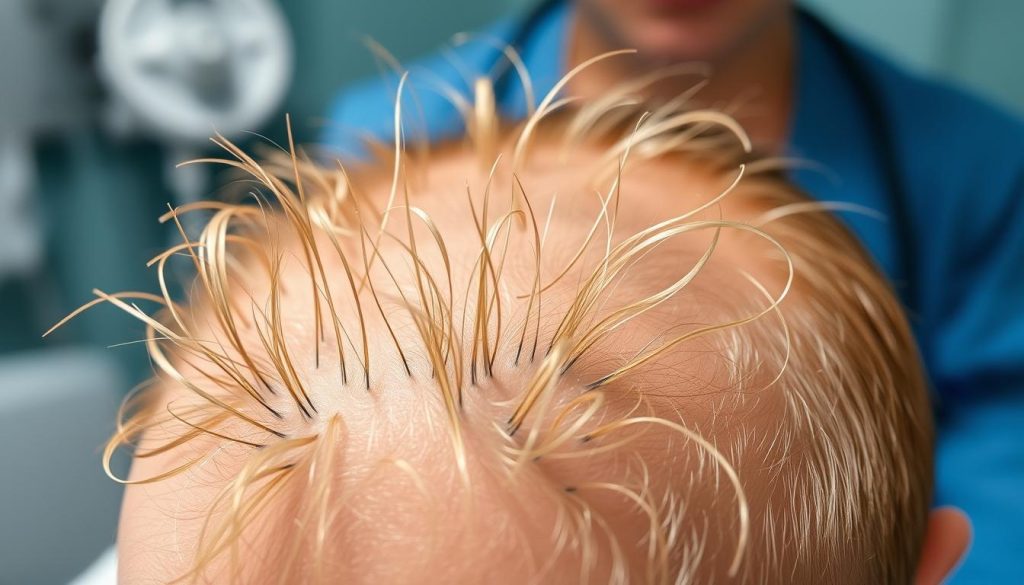
Likelihood of Hair Regrowth Post-Therapy
Good news: hair loss from CAR T cell therapy is usually temporary. Most people see their hair grow back within months after treatment. But, how fast and how much can vary.
A study in the Journal of Clinical Oncology found 90% of patients with hair loss after CAR T cell therapy saw significant regrowth in 6-12 months. This gives hope for those worried about their hair.
Factors Influencing Hair Regrowth Success
Several things can affect how well and fast hair grows back after CAR T cell therapy. These include:
- Age: Younger people tend to regrow hair faster and more completely than older ones.
- Overall health: Those with better health and stronger immune systems might regrow hair quicker.
- Type of hair loss: The kind of hair loss during treatment can affect how fast it grows back. Alopecia areata, for example, might take longer than telogen effluvium.
| Factor | Impact on Hair Regrowth |
|---|---|
| Age | Younger patients may experience faster regrowth |
| Overall Health | Better health can lead to quicker regrowth |
| Type of Hair Loss | Alopecia areata may result in slower regrowth compared to telogen effluvium |
“While the journey of hair regrowth after CAR T cell therapy can be challenging, it’s important to remember that most patients do experience significant regrowth within a year of treatment completion. Staying positive and focusing on overall health during this time can make a big difference.”
– Dr. Emily Thompson, Oncologist
Understanding hair regrowth after CAR T cell therapy can offer reassurance and hope. With time, patience, and care, most people can expect their hair to return after this life-saving treatment.
Advancements in Minimizing Hair Loss During CAR T Cell Therapy
CAR T cell therapy is changing how we fight cancer. Researchers are working hard to reduce side effects, like hair loss. They aim to keep patients’ quality of life high during treatment.
One new method targets cancer cells without harming healthy ones, like hair follicles. This could mean less hair loss for patients. Researchers are making CAR T cells smarter to focus only on cancer cells.
Another area of study is about protective agents for CAR T cell therapy. These might include things that help hair grow or reduce inflammation. They could protect hair follicles from treatment damage, helping hair stay and grow back faster.
“The goal is to find ways to harness the power of CAR T cell therapy while minimizing its impact on patients’ daily lives. Preventing or reducing hair loss is a significant step in that direction.”
As research goes on, patients might soon get new treatments that fight cancer well and keep their hair. The future looks bright for those looking for effective cancer treatments with fewer side effects.
Real Patient Experiences with CAR T Cell Therapy Hair Loss
Dealing with hair loss during CAR T cell therapy can be tough. The treatment gives hope against cancer, but the side effects, like hair loss, can be hard on the mind. Here, we share stories from patients who went through CAR T cell therapy. They talk about how to handle hair loss during treatment.
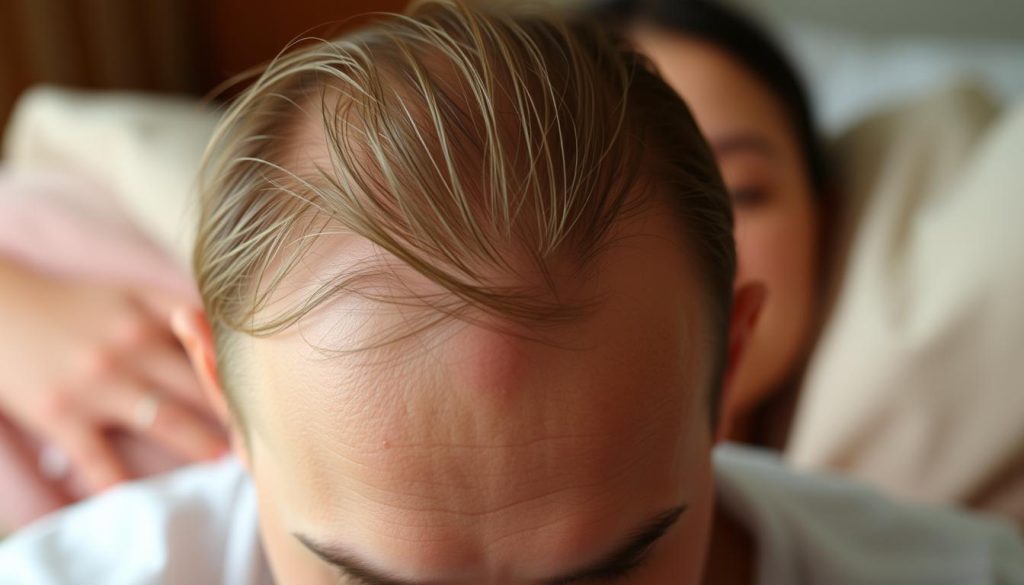
Personal Stories of Coping with Hair Loss During Treatment
Jennifer, a 45-year-old lymphoma survivor, talks about her hair loss during CAR T cell therapy:
“Losing my hair was really tough. It felt like I was losing a part of myself. But talking to other patients helped a lot. We shared our fears and hopes for the future.”
Mark, a 52-year-old leukemia survivor, shares how he dealt with his hair loss:
“I shaved my head before the hair loss got worse. It made me feel in control. I also got a few hats and beanies. They helped me feel more confident.”
Advice from Survivors for Managing Hair Loss
Survivors of CAR T cell therapy give advice for those going through hair loss:
- Join a support group or connect with other patients to share experiences and coping strategies
- Try different head coverings, like hats, scarves, or wigs, to find what makes you feel good
- Do things that make you feel confident and happy, like meditation or hobbies
- Talk to your loved ones about how you feel. Let them support you on your journey
| Coping Strategy | Benefit |
|---|---|
| Joining a support group | Sharing experiences and finding emotional support |
| Experimenting with head coverings | Boosting confidence and comfort in public settings |
| Focusing on self-care activities | Promoting emotional well-being and resilience |
| Being open with loved ones | Allowing for support and understanding throughout the journey |
We hope these patient stories and survivor advice offer comfort, guidance, and inspiration. They are for those facing hair loss during CAR T cell therapy.
The Role of Support Groups for CAR T Cell Therapy Patients
Going through CAR T cell therapy can be tough, with side effects like hair loss. But, patients don’t have to face these alone. Support groups offer emotional support and connect people with others who’ve been through it too.
Being part of a support group can really help CAR T cell therapy patients. They can:
- Share experiences and tips
- Get practical advice
- Find encouragement and understanding
- Feel less alone and lonely
Hospitals and cancer centers often have in-person support groups. They let patients meet others in their area. There are also online patient communities and forums for support from home.
“Joining a support group was a game-changer for me during my treatment. It helped me feel less alone and gave me the strength to keep fighting. I learned so much from others who had been through the same thing, and their advice was invaluable.”
When searching for a support group, think about:
| Factor | Considerations |
|---|---|
| Location | In-person or online |
| Group Size | Small, intimate groups or larger communities |
| Meeting Frequency | Weekly, monthly, or as needed |
| Focus | General CAR T cell therapy or specific to hair loss |
Looking for support is a sign of strength, not weakness. By connecting with others who get what you’re going through, you can find the emotional support and resources you need. Don’t be afraid to reach out and join a supportive patient community today.
Discussing Hair Loss Concerns with Your Oncologist
Talking openly with your doctor is key when you’re getting CAR T cell therapy. This is true, even when you worry about side effects like hair loss. Your oncologist is there to help you through treatment, and talking about hair loss can make you feel better.
When to Bring Up Hair Loss Concerns
It’s a good idea to talk about hair loss worries early on. You should bring it up during your first meeting or when you decide to start CAR T cell therapy. This way, your doctor can explain what to expect and help you get ready for hair loss.
Your oncologist wants to hear all your concerns, big or small. So, don’t be shy about sharing your hair loss worries at any time during treatment.
Questions to Ask Your Doctor About Hair Loss Management
Here are some questions to ask your oncologist about hair loss during CAR T cell therapy:
- What is the chance of hair loss with my treatment plan?
- When will hair loss start, and how long will it last?
- Is there anything I can do to prevent or lessen hair loss?
- Are there ways to deal with hair loss emotionally and practically?
- Can you suggest any cosmetic options, like wigs, to help me feel better?
- Will my hair grow back after treatment, and how long will it take?
“Talking to your doctor about hair loss can be emotional, but it’s an important conversation to have. Your oncologist can provide valuable guidance and support to help you navigate this challenging aspect of cancer treatment.”
Good communication with your doctor is essential for dealing with hair loss worries. It helps make sure you get the best care during CAR T cell therapy.
Comparing Hair Loss in CAR T Cell Therapy to Other Cancer Treatments
When looking at cancer treatments, it’s key to know about side effects like hair loss. CAR T cell therapy fights cancer well but can cause hair loss, like chemotherapy and radiation. Yet, the hair loss from CAR T cell therapy might be different.
To grasp the side effect differences in hair loss, let’s compare CAR T cell therapy to chemotherapy and radiation therapy.
Hair Loss in Chemotherapy vs. CAR T Cell Therapy
Chemotherapy often leads to total hair loss. It targets fast-growing cells, including hair follicles. CAR T cell therapy, on the other hand, causes less severe hair loss. It targets specific cancer cells, not all hair follicles.
| Treatment | Extent of Hair Loss | Pattern of Hair Loss |
|---|---|---|
| Chemotherapy | Widespread, often complete baldness | Affects all hair follicles |
| CAR T Cell Therapy | Less severe, more localized | Primarily affects targeted areas |
Hair Loss in Radiation Therapy vs. CAR T Cell Therapy
Radiation therapy can cause hair loss in the treated area. This loss is usually temporary and hair grows back after treatment ends. CAR T cell therapy also causes temporary hair loss, with hair regrowing after treatment.
“I experienced some hair thinning during my CAR T cell therapy, but it was nothing compared to the complete hair loss I had during chemotherapy. The localized nature of the hair loss with CAR T made it easier to manage and less noticeable.” – Sarah, CAR T cell therapy patient
While chemotherapy and radiation therapy can cause a lot of hair loss, CAR T cell therapy has notable differences. Knowing these differences helps patients choose their cancer treatment wisely and prepare for hair loss.
Ongoing Research to Reduce Hair Loss Side Effects in CAR T Cell Treatment
CAR T cell therapy is changing cancer treatment, but it can cause hair loss. Researchers are working on new ways to keep patients’ hair during treatment. They are conducting clinical trials to find these solutions.
Scalp cooling devices are being tested to reduce hair loss. These devices lower blood flow to the scalp, reducing drug impact on hair follicles. Trials are looking into their use for CAR T cell therapy.

Scientists are also studying hair loss pathways. They aim to find emerging therapies to stop hair loss without weakening CAR T cell therapy. They’re looking at:
- Inflammatory cytokines, such as IL-6 and TNF-alpha
- Growth factors, like TGF-beta and FGF5
- Cell cycle regulators, including p53 and cyclin D1
Stem cell therapies are another area of research. They aim to help hair grow back after CAR T cell treatment. This could help patients regain their hair faster and more fully.
“While hair loss can be a distressing side effect of CAR T cell therapy, ongoing research offers hope for patients who want to maintain their hair during treatment. By developing targeted strategies to prevent or minimize therapy-induced hair loss, we can improve the quality of life for cancer survivors undergoing this innovative treatment.”
As clinical trials show promise, the future looks bright. Patients can hope for CAR T cell therapy with fewer side effects. Keeping up with research helps patients and families make better treatment choices.
Embracing Your Appearance During and After CAR T Cell Therapy
Going through CAR T cell therapy is tough, both in body and mind. Dealing with side effects like hair loss is hard. But remember, your looks don’t show your true strength or beauty.
Hair loss can be tough to handle. But there are ways to feel better about yourself. Try out different hats, scarves, or wigs to find what makes you feel good. Surround yourself with people who see your inner beauty and strength.
Boosting Self-Confidence While Experiencing Hair Loss
Keeping a positive view of yourself is key during CAR T cell therapy. Do things that make you feel good, like:
- Pampering yourself with skincare routines
- Engaging in gentle exercise or yoga
- Expressing yourself through art or journaling
- Joining a support group for cancer survivors
Your worth isn’t just about your hair or looks. Celebrate your inner strength and resilience as you go through this.
Celebrating Survival and the Journey to Recovery
As you move through CAR T cell therapy and start recovering, celebrate your wins. Your survival shows your courage and determination. See the changes in your appearance as signs of your strength and victories.
Every day is a gift. Celebrate your survival and the progress you’ve made, no matter how small it may seem.
Surround yourself with people who uplift you. Do things that make you happy and remind you of the life ahead. Celebrating your survival inspires others facing similar challenges, showing them there’s hope and life after cancer.
Resources for CAR T Cell Therapy Patients Dealing with Hair Loss
Dealing with hair loss during CAR T cell therapy can be tough. But, there are many resources and support services to help. Online forums, like the American Cancer Society’s Cancer Survivors Network, connect patients with others who’ve gone through similar things. This offers a sense of community and understanding.
Local support groups, often found at hospitals or cancer centers, are also very helpful. These groups let patients share their feelings and strategies for managing hair loss. Organizations like CancerCare and the Leukemia & Lymphoma Society offer free support, including counseling and educational materials.
For financial help with wigs, hats, or other cosmetic solutions, there are grants available. The American Cancer Society’s “tlc” Tender Loving Care program and the Cancer Financial Assistance Coalition offer help. With these resources, patients can find the support and solutions they need to feel better about themselves and focus on recovery.
FAQ
Q: What is CAR T cell therapy?
A: CAR T cell therapy uses your own immune cells to fight cancer. It’s a new way to treat cancer that uses your body’s defenses. This method is more effective than old treatments.
Q: Why does hair loss occur during CAR T cell therapy?
A: Hair loss happens because the treatment triggers a strong immune response. The modified T cells attack cancer but might also harm healthy hair cells. This leads to temporary or permanent hair loss.
Q: How common is hair loss in CAR T cell therapy patients?
A: About 60% of patients experience hair loss during CAR T cell therapy. The severity and how long it lasts vary. It depends on age, health, and the treatment.
Q: What types of hair loss are associated with CAR T cell therapy?
A: There are two main types: alopecia areata and telogen effluvium. Alopecia areata causes patchy hair loss. Telogen effluvium leads to widespread hair shedding. Both can be upsetting but knowing about them helps.
Q: How long does hair loss last during CAR T cell treatment?
A: Hair loss can last from a few weeks to several months. Some people’s hair grows back in 6-12 months. Others might have permanent hair loss.
Q: Are there any ways to manage or disguise hair loss during treatment?
A: Yes, there are ways to deal with hair loss. Wearing wigs, hats, or scarves can help. Support groups and self-care also help with the emotional side.
Q: Will my hair grow back after completing CAR T cell therapy?
A: Most people’s hair grows back after treatment. But how fast and how much depends on the individual. Some see hair growth in months, others take longer.
Q: Are there any new treatments to prevent hair loss during CAR T cell therapy?
A: Researchers are exploring new ways to prevent hair loss. They’re looking at targeted therapies and protective agents. These are early steps but offer hope for the future.
Q: How can I connect with other patients who have experienced hair loss during CAR T cell therapy?
A: Joining a support group is a great way to connect. These groups offer a safe space to share and find support. Many hospitals and online communities have these groups.
Q: When should I discuss my hair loss concerns with my oncologist?
A: Talk to your oncologist about hair loss concerns right away. They can offer guidance and support. Don’t hesitate to ask about what to expect and how to cope.












